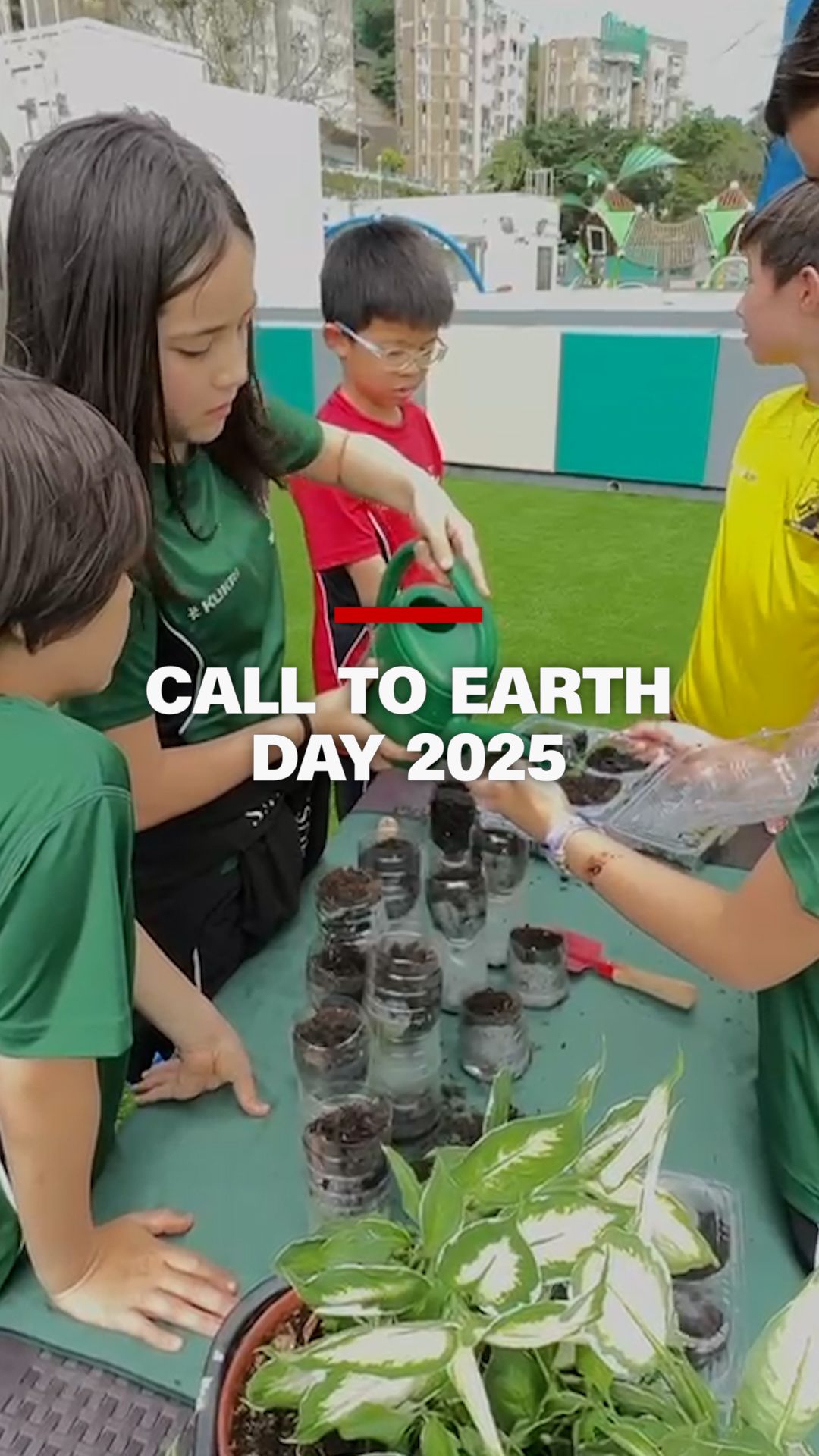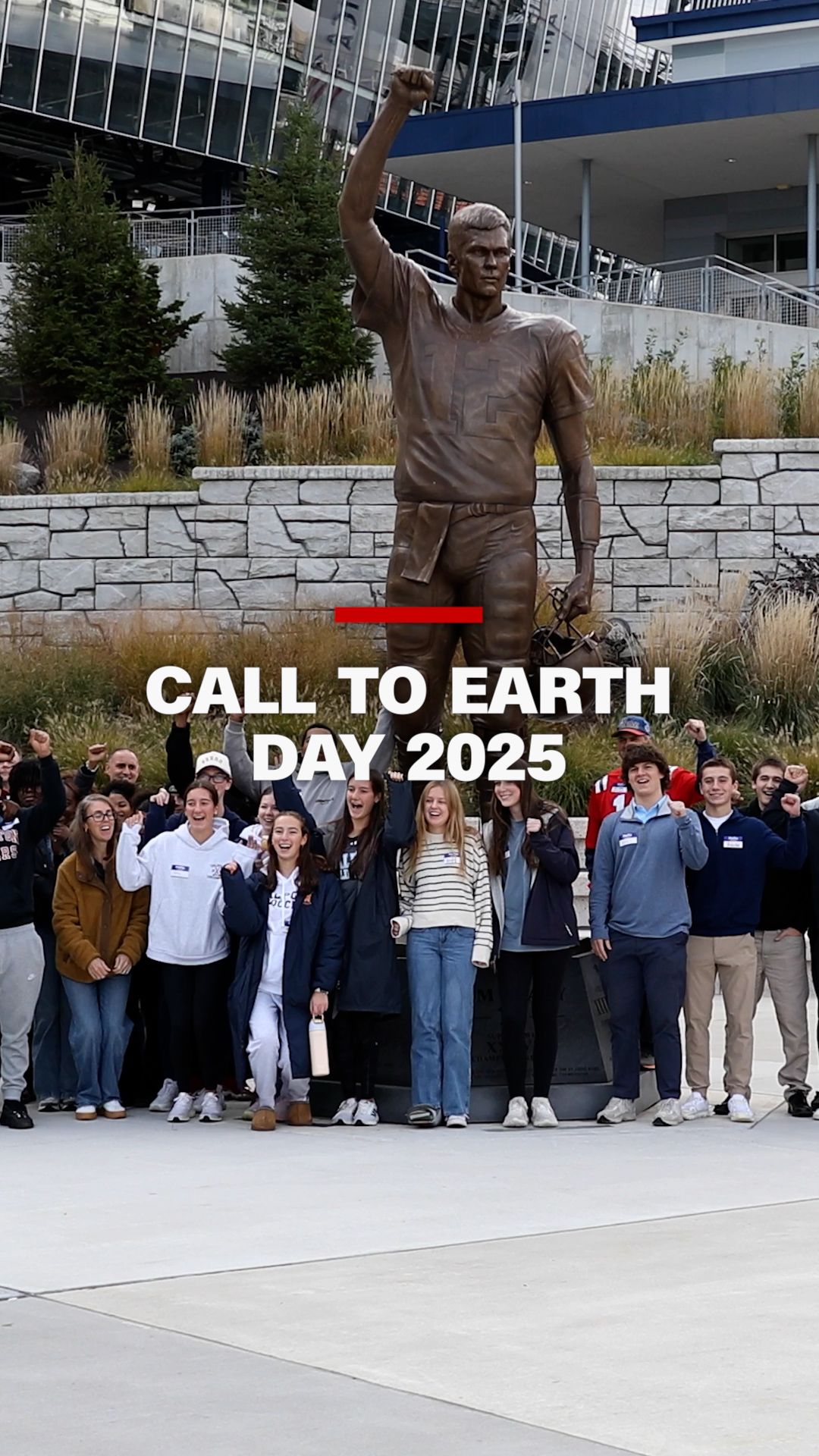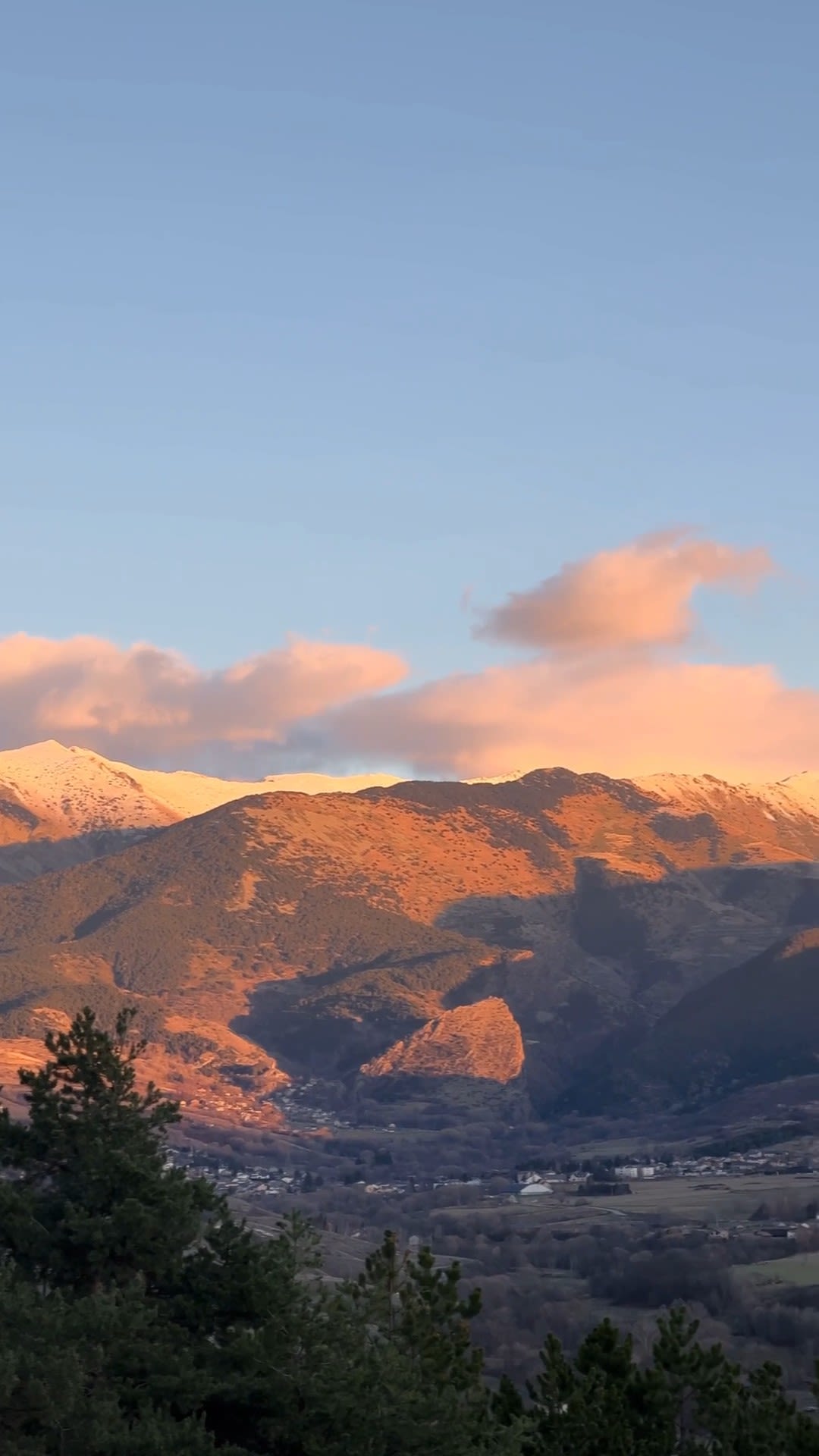What we covered here
• November 6 was the fifth annual Call to Earth Day, part of a CNN editorial series committed to reporting on the environmental challenges facing our planet, together with the solutions.
• Rolex’s Perpetual Planet Initiative has partnered with CNN to drive awareness and education around key sustainability issues and to inspire positive action.
• Young people around the world took part in a collective effort to help the planet and guard their green space.
That's all, for now ...
But events will continue in the days and weeks to come. Thanks to all the schools, organizations and individuals who took part and helped protect the planet.
You can see more from the Call to Earth team at cnn.com/calltoearth

A roundup of the content from across the world for Call To Earth Day 2025
A garden sprouts in a desert
Some boys at Zahrat Al-Sahra’a International School in Jeddah, Saudi Arabia have started a mini-garden on the roof of their school. Motivated by the goal of bringing some green into the desert they call home, they hauled cinderblocks to the top of the building, spread soil and planted seedlings. While this was started as a Call to Earth initiative, they intend on taking turns caring for it, so it keeps growing.
Mangroves in action: Karachi youth lead the way
Global Shapers Karachi Hub took action along the Karachi coastline, from Rehri Goth to Kedaro Island, joining the local fishing community to plant mangroves, form human chains, and help restore the natural shield protecting the shores.
Each propagule planted will grow into a tree that captures carbon, protects the coast, and supports marine ecosystems, showing youth-led initiatives making a real impact on local green spaces.
This company in India wants green thumbs for everyone
UST Global hosted a range of hands-on workshops to promote urban farming at its campuses in Trivandrum and Kochi, India. Attendees learned how their home gardens can protect biodiversity while strengthening local ecosystems and communities. To seal the deal, seeds and plants were handed out at the end, ensuring everyone now has the chance to start getting their hands dirty.
Giving back to the community in Atlanta
Ahead of Call to Earth Day, purpose-driven business collective B Local Georgia led by volunteer chair Chad Livsey, picked up trash around Castleberry Hill in Atlanta, Georgia.
The volunteer clean-up crew, which included local businesses like Wood Wizards Atlanta, bagged 18 bags of trash — and a discarded toilet — last Saturday, followed by a team dinner at Atlantucky Brewing.
“Give back to the communities that give to you,” the team wrote in an Instagram post.
A space transformed in South Africa
The Earth Child Project looked at the barren plot of land behind a South African school and saw a space rife with opportunity. Slowly they were able to transform it into the bountiful garden it is today. This space now provides produce that is used in over 1,000 meals a day in the school’s kitchen.

Earth Child Project celebrates Call To Earth Day 2025
Growing a greener tomorrow
The Global Shapers community in Dar es Salaam, Tanzania, joined Josephian Primary School to plant vegetables in the school garden.
Little gardeners feed the hungry
Students at Springdale Park Elementary School in Atlanta, Georgia are doing their part to help those in need. On the roof of their city school is a small garden growing various fruits and vegetables. The little gardeners donate the food to local food banks, feeding others in their community. On this Call to Earth Day, CNN’s Lynda Kinkade joined them as they worked in their garden.
Rewilding success stories
Whether it’s restoring green spaces or bringing wildlife back to thriving habitats, rewilding is all about giving nature room to heal. The Global Rewilding Alliance shared a moving collection of success stories from around the world.
Rewilding Europe also joined in posting: “Today on Call to Earth Day, we join voices around the world to celebrate nature’s ability to restore itself when given space and time.”
From sea grass to dolphins, conservationist work to protect the ocean in Cambodia
Marine Conservation Cambodia casts a wide net. This Call to Earth Day, they highlight their three core initiatives: marine mammal conservation, seagrass conservation and the sustainable coastal fisheries project. Their work aims to protect and restore the oceans of Cambodia while ensuring the communities that rely on them can continue to thrive.
They explain the ecological value of seagrass, and how they place cement blocks into the ocean that prevent trawlers from damaging it.
From saving the seas to planting trees
At Singapore School Clark, students are celebrating Call to Earth Day through a variety of sustainability-focussed activities.

From coastal clean-ups and native tree planting to storytelling sessions with preschoolers and digital poster-making by secondary pupils, students are learning the importance of protecting the Earth.

Nairobi students turn forest into classroom
From Nairobi, Kenya, CNN’s Victoria Rubadibi reports from Peponi House, where the “forest school” is in full swing. Students are learning firsthand how trees cool the environment, protect soil, and boost biodiversity — complete with a bug hotel made of leaves and logs, and “mouse motorways” so tiny critters can safely roam.

Victoria Rubadiri reports from the Peponi House school in Nairobi for Call To Earth Day 2025.
Armed with seeds, students push for change
Greenhill Recycling joined forces with students from Taadel Private School, Ikeja Senior Grammar School and Grange School Lagos in Nigeria to improve their local environment one seedling at a time. The gardens they created and cultivated provide food for the community while creating spaces for people to learn about the environment.
Protecting urban green spaces
Eco-influencer Melissa Tan joined CNN’s Call to Earth Day to spotlight the urgent need to safeguard our remaining natural spaces, especially in rapidly developing urban areas. She highlights the Pulai Trail Urban Forest, one of Kuala Lumpur’s last green spaces. Nestled near Bangsar, it’s a biodiverse sanctuary home to native species. As cities expand, green spaces like Pulai Trail face mounting pressure. Tan urges action, from removing invasive species and rehabilitating habitats to joining forces with local communities and nonprofits to resist overdevelopment.
From micro to macro, Hong Kong students are turning the city green
At the German Swiss International School in Hong Kong, CNN’s Kristie Lu Stout spoke to students who are nurturing seedlings and planting seeds they’ve harvested, using recycled materials as containers.

Kristie Lu Stout reports from the German Swiss International School in Hong Kong for Call To Earth Day 2025.
Protecting the Pyrenees
Environmental and animal rights activist Carlota Bruna speaks about why the Pyrenees, a mountain range straddling the border of France and Spain, feel like home, and their role in sheltering a wide range of species, purifying the air and protecting the global ecosphere.
Nigeria's "Young guardians of the Earth"
To celebrate Call to Earth Day, climate change advocate and environmentalist Nkemjika Ugonna Lucy is leading students in Ogun State, Nigeria, to plant trees and learn about the importance of green spaces and their impact on human health and social wellbeing.
In partnership with the Planteer Alliance, Project Conserve River and the Environmental and Economic Resource Centre, the theme of the event is “Young guardians of the Earth.” Nkemjika hopes Call to Earth day will encourage the students to think about how they can protect the environment throughout their lives. Oh, and she also expressed her love of nature, in verse!
Protecting global waterways
River Cleanup, a global organization dedicated to making rivers plastic free, sponsored 14 events in honor of Call to Earth Day, encouraging volunteers around the world — in Belgium, the Democratic Republic of Congo (DRC) and Cameroon, to name a few — to remove trash from parks near waterways and rivers.
The organization gets local communities involved in removing plastic from the environment, using education programs to create “River Warriors,” like this one in Kinshasa, DRC.
Taking the green sports pledge
At Gillette Stadium in Boston, the New England Patriots teamed up with Project Green Schools and the Green Sports Alliance Foundation to teach students about the steps professional sports is taking to go green, while advocating for more sustainable careers in sport for the next generation.
Ariadna Goodman, the 12-year old student leader of Project Green Schools, tells CNN all about the education initiative.

Project Green Schools celebrate Call To Earth Day 2025 at Gilette Stadium
Trash pick-up to preserve green spaces
Students at Busan Foreign School (BFS), in South Korea, joined together for a trash pick-up event in honor of Call to Earth Day.
The school is located at the base of Jangsan mountain, in a neighborhood “full of green spaces,” where students picked up cans, bottles, and cardboard, as well as non-recyclable trash underneath bushes and along walking paths.
A dedicated group of volunteers from the BFS Middle School Student Council and High School Service Club also engaged in a separate trash pick-up event along the mountain hiking trails and reservoir area, helping to preserve the green spaces around their school.
Top of the class
Students at Tbilisi Public School 146 in the country of Georgia are teaching classmates about the importance of protecting forests and the environment, and the impact of pollution.
Each video in the series highlights how the next generation is learning to care for nature.
Terminating pollution
Planet Matters, a global movement dedicated to fighting plastic pollution through fun and community-driven cleanups, organized a beach cleanup and encouraged people to enjoy nature while keeping it clean.
For Call to Earth Day, they also teamed up with The Schwarzenegger Climate Initiative for another beach cleanup, channeling Arnold’s iconic energy: “Together, we took action because as Arnold always says: ‘We must terminate pollution.’”
A London school takes a holistic approach to sustainability
Students at the North Bridge House Senior School in London take CNN inside the school’s holistic plan to become more sustainable –– inside and outside the classroom.

Nadir Bashir reports from North Bridge House Senior School Call To Earth Day 2025
Fine dining meets planet care
Dieci restaurant joins Call to Earth Day with a clear message: sustainability belongs at the table. Highlighting three-star recognition from Food Made Good and Green Key International Awards, Dieci outlines real practices — full recycling, zero-waste operations, and complete energy independence. They credit community partnerships for turning values into daily action — a reminder that restaurants can be as central to climate leadership as they are to cuisine.












